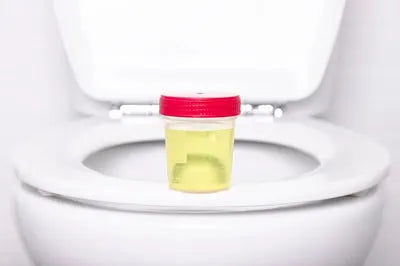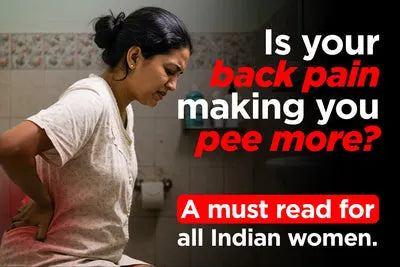Do you have that nagging pain at the intersection of your belly and your private parts? That's where the bladder is located. Frequent and strong pain in that area could indicate Painful Bladder Syndrome (PBS). Doctors also call it Interstitial Cystitis (IC).
In this article, we will explore in detail what exactly PBS is. We will also discuss what causes painful bladder syndrome and how it can affect your daily life.
What is Painful Bladder Syndrome?
Painful Bladder Syndrome is a long-term or recurring pain in the bladder and the surrounding area. It causes great discomfort, but with proper medical treatment and exercises, this pain can be managed. People of any age and gender can suffer from PBS.
It is easy to confuse PBS with Urinary Tract Infections (UTI)s because both cause pain in the bladder and even while urinating. But they both are totally different. Unlike UTIs, PBS doesn't involve the growth of bacteria in the urinary tract.
People with bladder syndrome pain must always take note of their surroundings. They must ensure that they have a washroom available to use whenever needed. As this discomfort usually causes frequent urination, you might have to use the washroom more often than another person your age would.
What Causes Painful Bladder Syndrome?
Doctors still don't know the exact cause of painful bladder syndrome. However, there are a few theories that most prominent medical professionals believe. Here are some of the reasons that could lead to a painful bladder:
-
Bladder Lining Damage
Your bladder has a protective lining that covers the muscles underneath. If this lining is torn or damaged, the bladder muscles get exposed. Irritants in your urine can trouble your muscles by causing inflammation or irritation. This can be one of the major causes of PBS.
-
Pelvic Floor Dysfunction
Pelvic floor dysfunction is a serious medical condition where the muscles of the pelvic area are weakened. They are no longer able to support the organs in their position. This might cause a shift in the position of your bladder. The change in position can lead to inflammation and irritation.
-
Nerve Dysfunction
Nerve dysfunction refers to the damage to your nerves near the bladder. This damage can cause the bladder to lose control over its action. Though this isn't a direct cause of PBS, it can certainly increase the severity of your symptoms.
-
Autoimmune disorder
First, let's understand what an autoimmune disorder is. It is a medical condition where your body's immune system attacks one or many parts of your body. This can happen accidentally or to prevent an infection that is taking root.
Some researchers believe that our body accidentally attacks the bladder tissue, which can cause bladder pain syndrome. Note that this is just a theory that some researchers believe.
-
Genetic Predisposition
Some researchers believe that PBS is a genetic disorder. You inherit it from your family. If one of your direct family members has PBS, there's a chance that you might get PBS too.
Does it Impact Urination?
Unfortunately, yes. Bladder syndrome pain significantly impacts urination. You can expect the following when it comes to the urination of people with PBS.
- You may feel the need to pee more often.
- You may urgently need to urinate without having much control over it.
- You may need to pee more frequently during the night, which will disrupt your sleep.
- You may feel discomfort or even a sting while you pee.
- You may not have complete control over your bladder, so you can't empty it completely. This will give you the nagging feeling that you have to pee when, in fact, you don't.
All of this is not easy to deal with, especially if you have a full-time job. There's no foolproof way to avoid these things, but you can take precautions to help you regulate your day-to-day activities. It's time you consider wearing a diaper.
This may sound weird and feel embarrassing but know that you are just trying to improve your lifestyle. There are great products like Friends Adult Diapers Premium Pants that can be easily worn under all types of clothes. These diapers offer up to 10 hours of protection against leakage and moisture due to their super-absorbent core with a rapid absorption layer.
Take some time to get used to it before you wear it to work. Try them out in your home where you feel safe. You'll soon recognize how these can change your lifestyle significantly. Azadi Mubarak!
Product Recommendations
Conclusion
Painful bladder syndrome is not a life-threatening condition but, if ignored, can cause severe pain and loss of control over urination. The exact cause of PBS is still unknown, but there are several theories, as mentioned in this article. Bladder syndrome pain cannot be treated completely, but you can control the symptoms by lifestyle changes and proper medication. It's important to consult a doctor before taking any medications for the pain.
FAQs
What causes bladder pain without infection?
Bladder pain without infection can be caused by pelvic floor muscle dysfunction, kidney stones, endometriosis (tissue growing outside the uterus), vulvodynia (chronic pain in the vulva), bladder irritation due to certain foods or beverages, bladder stones, bladder cancer, etc.
Is painful bladder syndrome serious?
Painful bladder syndrome is not a life-threatening condition, but it is serious in the sense that it significantly affects your quality of life.
Does painful bladder syndrome go away?
No, painful bladder syndrome doesn't go away permanently. You can manage its symptoms with medications and lifestyle changes.
Does walking help with painful bladder syndrome?
Walking doesn't help relieve your painful bladder, but it's a great exercise for the body.
What does painful bladder syndrome feel like?
Painful bladder syndrome feels different for different individuals. Some experience minor discomfort while peeing, while others can have constant pain in the pelvic area. The intensity of the pain also varies from person to person.




















